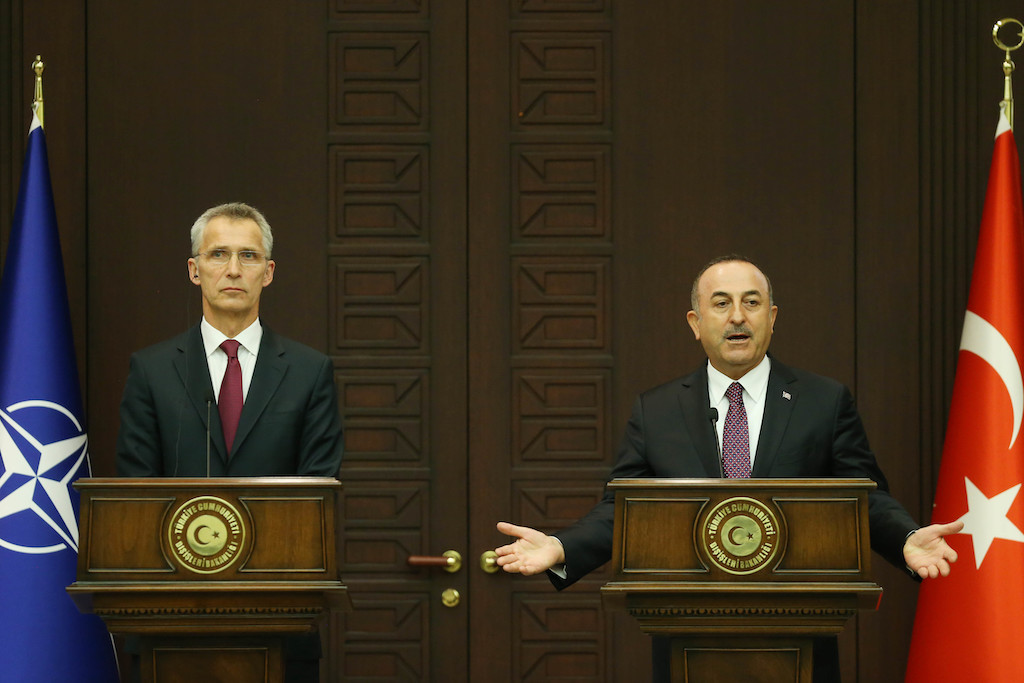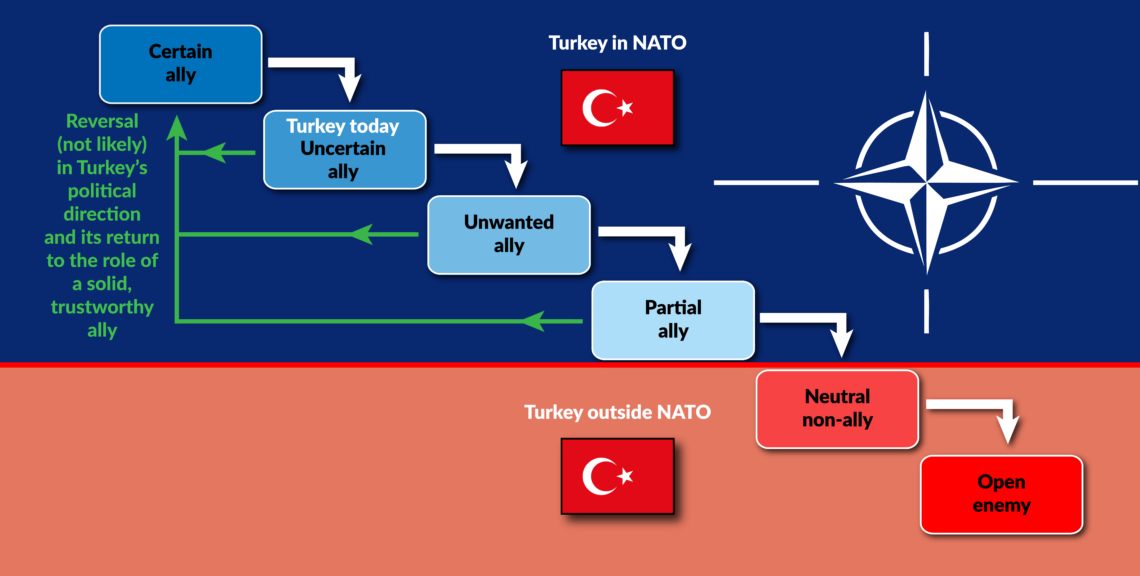Scenarios for Turkey’s role in NATO
The political behavior of Turkey poses problems for NATO. Until recently, the country was a formidable partner of the Western alliance in its confrontation with the Soviet Union and a buffer against threats from the Middle East. Turkey still fields the alliance’s second-largest army, but its interests do not match U.S. and European plans.

In a nutshell
- Turkey’s relations with NATO have soured to the point when the country’s standing as a member becomes an issue
- Ankara’s insistence on purchasing a Russian defense system has alarmed the alliance as a challenge to its cohesion
- NATO has a precedent of a member restricting its presence in the alliance without crashing entirely out of it
Turkey has been making a strategic turn in its domestic and international policies. Its relations with the EU started to sour in large part due to the lack of progress in Turkey’s accession negotiations and turned into a crisis during the war in Syria, when the U.S. support for the Syrian Kurds undermined, in Ankara’s view, Turkey’s vital national security interests. The process of mutual alienation and growing distrust has been described in detail in GIS dossiers. While Turkey’s internal evolution has evoked much mutual recrimination, the changes in Ankara’s foreign policy, especially the aspects related to Turkey’s membership in NATO, may, under certain conditions, necessitate a practical response from the alliance.
Sticking point
As its relations with Europe and the U.S. deteriorated, Turkey began a parallel process of rapprochement with Russia. Its most spectacular manifestation – which may estrange Turkey from Washington and other NATO capitals – is the purchase of the S-400, Russia’s state-of-the-art Anti- Access/Area Denial (A2/AD) air defense system. Washington objected to this transaction, describing it as unacceptable from the standpoint of NATO’s security. A deployed S-400 system, it was argued, could give Russia access to sensitive information on U.S. and allied military air systems operating in the region. Turkey, however, did not cancel this deal. In response, the Trump administration suspended Turkey’s participation in the F-35 fighter program and has threatened to put sanctions on Turkey under the Countering America’s Adversaries Through Sanctions Act (CAATSA). The 2017 legislation identifies Russia as an adversary of the U.S. and any business deal with it, especially involving military equipment, can trigger sanctions.
Several scenarios
This development could mark the beginning of a breakdown in military relations between the U.S. and Turkey. Its consequences would inevitably affect the entire NATO alliance. There are several scenarios for Turkey’s future relations with NATO allies.
Until recently, Turkey was a strong and reliable ally in NATO, a formidable partner of the Western alliance in its confrontation with the Soviet Union and a buffer against threats from the Middle East. It still fields the second-largest army in NATO, after the U.S. A somewhat demanding member of the alliance in the past, Turkey may be seen as an increasingly uncertain partner now. It is unknown whether and to what extent it can remain in this role. In the face of the Russian challenge in Europe and the multiple threats in the Middle East, one cannot be absolutely sure if in the moment of truth Ankara will stand on the side of NATO allies, or if they will risk standing by Turkey.
This will likely force the alliance to review contingency plans for responses to threats and, perhaps, to add a new set of scenarios for having to deal with potential challenges without Turkey in the picture. The Turkey-related uncertainty is a major political, strategic and operational dilemma to ponder at the NATO headquarters in Europe and in the Pentagon.
Limping alliance
Of course, Turkey might alter its course again – bigger political turnarounds have happened – but this does not seem likely to take place in the near to medium-term future, as this would not necessarily be in the country’s interest. But even if that happened, no doubt to the great relief and satisfaction of other members of the alliance, it would take a long time for both sides to regain confidence in each other. Today’s aggravating issues, such as the Kurds, Cyprus and Greece, are not going to disappear overnight either, making this hypothetical rapprochement even more difficult and time-consuming.
A troubled NATO member state can become an unwanted ally.
If it remains uncertain and defiant, a troubled NATO member state can become an unwanted ally. Should this happen with Turkey, tensions within the alliance would intensify. NATO does not have procedures for getting rid of unwanted members. Membership criteria can only be inferred from the basic principles on which the alliance is built – democracy, individual freedom and the rule of law – and those parts of the Washington Treaty which have it that the international engagements of the signatories must not stand in conflict with its provisions, in particular those concerning collective defense.
The treaty, however, does not contain any indication of what ought to be done if a member state does not meet such criteria. In practice, therefore, the other states would only have the option of pushing such an unwanted ally out of their circle. That means moving away from cooperation with Ankara, canceling contacts, withdrawing from joint undertakings and structures organized by Turkey and banning it from their own undertakings, freezing infrastructure projects on Turkey’s territory, etc. Under such a scenario, NATO would need to develop some new, parallel procedures to ensure effective functioning of the alliance without Turkey.
Facts & figures
Turkey in NATO, worsening scenarios ladder

If Turkey formally remained in NATO while in a deepening conflict with other members, the alliance would face a Trojan horse situation and run the risk of Ankara vetoing, at the political level, its major decisions. This could paralyze the alliance. Under such circumstances, NATO’s deterrent power and defense capabilities would suffer greatly. While it is difficult, for historical reasons among others, to imagine, for example, Turkey acting as a stooge for Russia, such a situation would benefit Moscow anyway, by expanding its strategic options in the hybrid cold war with the West. Could the limping alliance remain an effective force for long? Probably not. Therefore, under this scenario, the best practical solution for NATO would be to disband and immediately establish a similar defense organization in its place, leaving Turkey out.
The French solution
Another scenario is a withdrawal of Turkey from allied military structures. There is a precedent for this: as a result of the policies of President Charles de Gaulle (1959-1969), France stayed outside the integrated military structures of NATO for more than 40 years (1966-2009). This option, of a “partial ally” (or “semi-ally,”) is quite probable today. It would be the mildest of possible negative consequences of the current crisis for both Turkey and NATO.
NATO functioned effectively with France outside the joint military structures.
Remaining politically in the alliance would bear, to an extent, on Ankara’s policies (a plus to the West) while allowing its military structures to exit would free Turkey of military obligations and restrictions it no longer wants – including, for example, the limits on military procurement. In addition, the country would retain the freedom to return to full membership at its own initiative, which could be a card in Turkey’s strategic game with other players outside NATO, such as Russia.
Although NATO would be less than comfortable under this scenario, as with the “unwanted ally” scenario, the situation would at least be clear, giving the alliance freedom in military planning with no ambiguity as to Turkey’s participation in integrated operations. Also, NATO would have an excuse to establish parallel decision-making procedures on key defense matters, bypassing the risk of Turkey blocking them. The organization functioned quite effectively with France outside the joint military structures, so one can reasonably assume it could use its experience from that period to establish “semi-allied” relations with Turkey that could be sustained for a long time.
Once out of NATO, Turkey’s alliance with Russia is highly unlikely.
Further options are associated with the possibility of Turkey’s full departure from NATO. One is a crashing out, while the other is a planned, relatively calm and orderly exit.
Full exit unlikely
Turkey’s unfriendly and rapid exit from NATO could be a political and strategic act resulting from Ankara’s sharp confrontation with the U.S. and other NATO countries. Turkey’s (immediate) entry into a formal alliance with Russia is highly unlikely, given its interests in the Black Sea, Caucasus, the Caspian Basin, the Western Balkans and the Mediterranean. So is the possibility of Turkey building a regional alliance with the participation of, for example, Iran. For Ankara, such scenarios are not acceptable as it would risk making Turkey dependent on Russia or another large regional power.
If it decided to leave NATO entirely, Turkey may opt for an orderly exit, a result of a strategic calculation. This could take place within the framework of a long-term plan to build itself up as an independent regional superpower, a shareholder in the global game of interests, not just a partner of a bigger power. Mimicking China’s path to superpower supremacy in its corner of the world could be a tempting strategy for Turkey. A hostile confrontation with the U.S. and European countries would be an obstacle for Turkey to accumulate power.
All in all, the sum of the differences in how NATO and Turkey perceive their intentions and interests is one of the important factors shaping the future Euro-Atlantic security environment. The estrangement process has already passed the critical point: a return to the previous state of relations between the partners no longer seems possible.
Looking forward, the uncomfortable perception of Turkey as a rebellious and uncertain ally is likely to continue among NATO members in the near future. At any time, Turkey could take on the status of unwanted ally. One cannot rule out that Ankara will soon decide to suspend the country’s participation in NATO military structures. In the longer term, Turkey is more likely to completely exit NATO than return as a committed member of the alliance.








